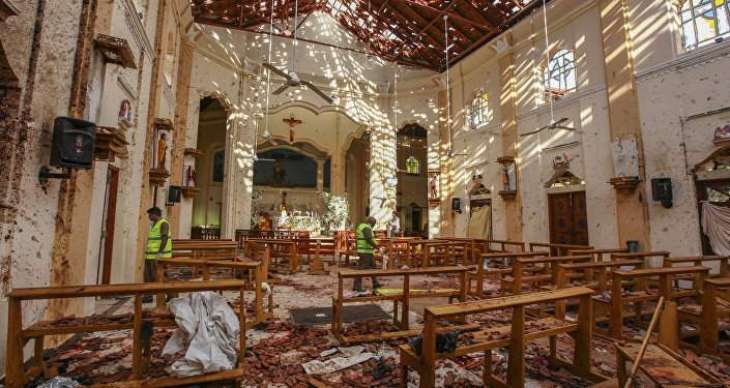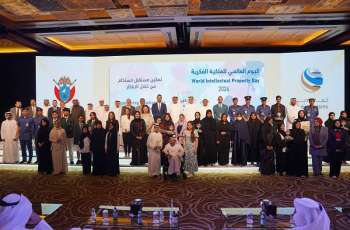After working for the Etihad Airways in the United Arab Emirates (UAE) for more than ten years, Sheik Hasmathullah, a Muslim from Negombo, Sri Lanka, decided to return home in January 2018 for the sake of offering his children a better education
MOSCOW (Pakistan Point News / Sputnik - 23rd April, 2019) After working for the Etihad Airways in the United Arab Emirates (UAE) for more than ten years, Sheik Hasmathullah, a Muslim from Negombo, Sri Lanka, decided to return home in January 2018 for the sake of offering his children a better education."Even with all the facilities and education allowances available in Abu Dahabi (in the UAE), I didn't like the atmosphere there. I want my children to mingle with the society. In the Gulf, your children will be restricted to the house, as they cannot go out because of the heat. In Sri Lanka, they can mingle with other communities and will also be safer for them. They'll have a better childhood in Sri Lanka than being in the Gulf," Hasmathullah, the former cargo duty manager of the Etihad Airways, told Sputnik during a phone interview.
However, the 33-year-old father's plan faced serious disruption after deadly blasts rocked several Christian churches and high-end hotels in a number of cities in Sri Lanka on Easter Sunday, killing over 300 people with about 500 others injured.
Authorities in Sri Lanka have blamed a Muslim militant group, known as the National Thowheeth Jama'ath, for carrying out the devastating attacks. Police spokesman Ruwan Gunasekara told reporters that 40 suspects have been arrested on suspicion of links to the bombings.
Hasmathullah's house in Negombo is about 500 meters (about 1640 feet) away from St. Sebastian Catholic church, which was targeted in the bombing attacks and suffered serious casualties. The Muslim had to flee from his home with his wife and three young children aged from 5-8 on Monday evening, fearing retribution against Muslims by angry family members and friends of the victims in the deadly attacks.
"My residence is very close to the church that was targeted. We're the first Muslim community after the intersection on the main road. Me being a Muslim, I feel insecure to stay at my place. I had to leave my area with my family and come to my hometown in Colombo to stay at my mother's house," he said.
Most of his neighbors and friends who are Muslims in the neighborhood have fled their homes, Hasmathullah added.
"The things we have heard are that they'll attack us or they want to have bloodshed on us. Since we're with living with our children, we want to stay away from those troubles. I don't know how long I'll stay here (in Colombo). But that's the insecurities I'm facing for the time being," he said.
Muslims in the local community had not experienced physical retaliations and mostly faced verbal threats from angry individuals who may have been family members or friends of those affected in the tragic attacks, Hasmathullah explained.
"The people who have been affected in the barbaric attacks, they're even looking at us, the innocent Muslims, in a bad way. They're not confident about us anymore. Of course, with all the due respect to the victims in the tragedy and the emotions of their family and friends, but now they're trying to show their agony on the Muslim community," he said.
Hasmathullah argued that it is unfair for the innocent Muslims to face possible retributions for the actions of some radicalized individuals.
"Of course, we have all the respects to all the individuals and all the victims who have been affected in the tragedy. For things that people with radical thoughts have done, why should other innocent people who have never thought of this pay the price? Why should we have bloodshed once again in our country or even in our community?" he said.
Nevertheless, Hasmathullah expressed that he understood the limitations on how much support from the Muslim community can be accepted by those Christians affected in the tragic events.
"Honestly, me being a Muslim, or just as a human being, I want to get along with them [the affected Christians] and to work on the situation. But I cannot do that because of the emotions they're having now. They will not accept me at this stage. For the time being, we have raised white flags and we have banners showing solidarity to the Christian community. Physically, we want to get involved with them and give them our support. But we cannot do that at this stage," he said.
MUSLIMS ATTENDING CATHOLIC SCHOOLS
Before Sunday's deadly attacks, different religious communities, including Christians, Muslims and Buddhists and Hindus, have always lived in peace and harmony in Sri Lanka for the past ten years, since the end of the nation's civil war involving the Tamil Tigers in 2009, according to Hasmathullah.
As a Muslim who attended a local Buddhist school, Hasmathullah sent her two older daughters to local Catholic schools in Negombo and planned to enroll his 5-year-old son at a Catholic school as well.
"The reason I returned to Sri Lanka is for my children. That's my main concern. The best school I was planning to enroll my son in is the Maris Stella College, which is a Catholic school that offers primary and secondary education. I have been invited to an interview at the school next Saturday. But now, I have very little hope that they would accept to meet me for the interview or admit my child to that school. My biggest worry is that my son's education is going to be very challenging for me now," he said.
The Muslim father explained that he chose Catholic school for his children because the quality of education is better in those schools.
"Though there're other Muslim schools, I'm not confident about their curriculum and the staff members there. I feel more confident about the curriculum in the Catholic schools. That's why I wanted to send my children to the Catholic schools," he said.
Hasmathullah stressed he had never had problems with people from other religious communities in Negombo.
"I went to a Buddhist school myself. During interactions with my friends, we were never separated because of our religious beliefs. I was visiting their homes and they came to my home as well. It was a mixed culture. I believe the more you mix with other cultures, the more you'll understand about other cultures. For my daughters who have already been attending Catholic schools, they have had never had any problem. They even have more Catholic friends than Muslim friends. We were getting along with the parents of my daughters' friends and we worked with them very well in different school activities. We have never had any issues with any of them," he said.
For a country dominated by Buddhists like Sri Lanka, religious minorities such as Christians and Muslims have often been the target of violence and discrimination, according to Ruki Fernando, a Colombo-based Roman Catholic human rights activist, who has been documenting such religious violations in the country.
"It (the violations) has been against both Christians and Muslims for a number of years. Particularly, at the end of the [civil] war, there had been more visible escalation of intimation and attacks on Christians and Muslims. But between Christians and Muslims, there have been a very high quality relationship," Fernando told Sputnik.
According to the 2012 census in Sri Lanka, about 70 percent of the nation's population of around 22 million are Buddhist, 12.6 percent Hindu, 9.7 percent Muslim and 7.6 percent Christian.
The Catholic activist noted that only some Buddhist monks have been identified as perpetrators behind the attacks on both Christians and Muslims. This is why the Colombo-based activist has been puzzled by the allegation that a Muslim militant group carried out the devastating attacks on Christian churches.
"It's very difficult for me to understand why (Christians are being targeted in the attacks). If you think about it in a very cruel way, because Muslims faced a lot of problems from the Buddhists in the past, then in a cruel way one would think that some extreme Muslims may want to retaliate against the Buddhists. That's why I found it was very difficult for me to understand the rationale behind the attacks," he said.
Fernando noted that one possible explanation of why Christian churches were being targeted was that Christianity is often viewed as a religion brought by the Portuguese when the colonized the country, as the attacks also targeted high-end hotels with large number of foreign guests.
Nevertheless, the Catholic activist stressed that the tragic events should become an opportunity for different religious communities to demonstrate their unity in face of adversity.
"When we accuse some Buddhists of carrying out the attacks on Christians or Muslims, we're not accusing all the Buddhists. The same principle must apply to the Muslims as well. Of course, the perpetrators should be dealt with legally. But that shouldn't become a reason to blame the whole Muslim community. The Muslim leaders and ordinary Muslims have not only condemned the attacks, but also offered their solidarity and assistance. I think we can make this an opportunity to support different religious communities and reject violence in any form against anyone. We can use this as a rally point to ensure all religious communities have their rights, especially for the smaller groups like the Christians and Muslims. I think this might be the best tribute we can give to the people who have been killed," he said.
Fernando stressed that authorities in Sri Lanka must step up their efforts in protecting different religious communities and preventing similar attacks from taking place, as media reports suggested that the police may have ignored legitimate warnings of the impending attacks.




